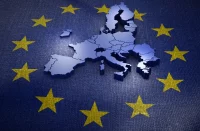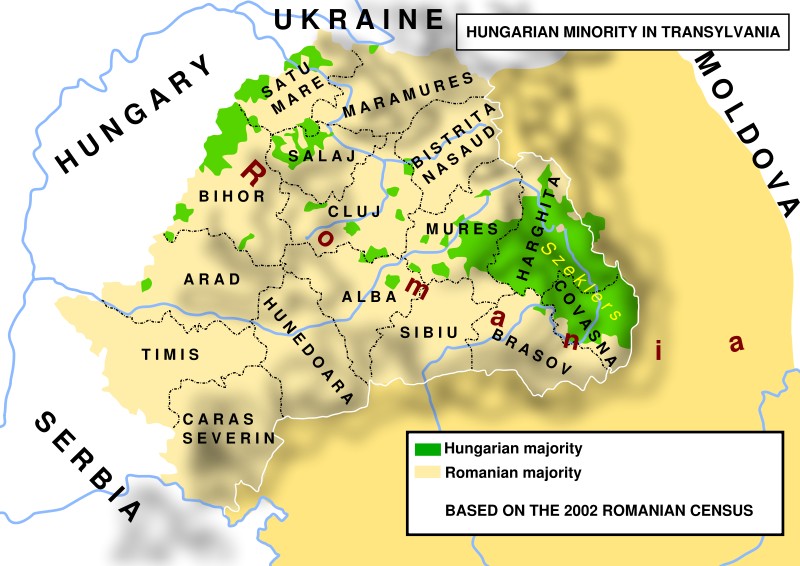The Romanian Prime Minister implied that pro-autonomy Hungarians in the “Szeklerland” region should be hung in their town squares.
Premier Mihai Tudose, who just resigned because of an unrelated power struggle, was responding to the news that three ethnic Hungarian minority parties in the territory that they call “Szeklerland” had joined forces to lobby for autonomy in the central Romanian region of Transylvania, harshly promising that “I have sent message that if the Szekler flag flies over the institutions over there, they will all fly next to the flag. Autonomy for Szeklers is out of the question.” His undiplomatic remark was met with instant condemnation from Budapest, which has been more active over the past few years in supporting the rights of its ethnic compatriots abroad that it feels were unfairly cut off from their homeland after the 1920 Treaty of Trianon.
Thus far the most newsworthy efforts in this sphere have recently been those related to the Hungarian minority in Ukraine’s western region of Transcarpathia, but the situation in Transylvania might be even more important because it involves developing hostilities between two NATO- and EU-member states in so-called “New Europe’s” “Three Seas” region. The rising sense of national identity that’s accompanied the recent surge of populism across the world has seen the politicized revival of the Hungarian diaspora issue in the heart of Europe, and Orban’s activism on this group’s behalf could easily lead to the EU labeling him as the greatest threat to the bloc.
The organization’s post-Brexit future is in doubt, and the Polish-Hungarian Strategic Partnership is working hard to reform the EU in making it more decentralized and sovereignty-friendly, but the most dramatic change could be the readjustment of some member states’ internal borders in the continental heartland if the Hungarian minority decides to flex their political muscles. The people of “Szeklerland” are separated from Hungary proper by a swath of mostly Romanian-inhabited territory, but their pro-autonomy efforts could encourage the fragmentation of the country along regional-centric lines and precipitate a constitutional crisis in the formally unitary state. It could also provoke a nationalist reaction from Romanians as well, thereby opening up a whole can of worms if it transforms into violence.
Romania and Ukraine aren’t the only areas that could be affected by this process either, since Serbia’s northern Vojvodina region has a small Hungarian minority near the borderland, though this “front” is less likely to see any “action” when compared to what might transpire in Southern Slovakia. For hundreds of years, the territory of so-called “Upper Hungary” was regarded as an inseparable part of Hungarian Civilization, and approximately half a million Hungarians still live in Southern Slovakia and constitute a little less than 10% of the country’s total population. That’s why there’s a high likelihood that any inadvertent crisis in “Szeklerland” will actually lead to a “Slovak Crisis” as well, though the latter could jeopardize the unity of the Visegrad Four and undermine the EuroRealist reform campaign if it’s not preemptively dealt with by all responsible players.
The post presented is the partial transcript of the CONTEXT COUNTDOWN radio program on Sputnik News, aired on Friday Jan 19, 2018:
DISCLAIMER: The author writes for this publication in a private capacity which is unrepresentative of anyone or any organization except for his own personal views. Nothing written by the author should ever be conflated with the editorial views or official positions of any other media outlet or institution.















Highly unlikely. I mean, Viktor Orban would not lose only his second main export market and any opportunity to get at least a part of the Black Sea gas but he would also forfeit any chance to become a regional powerhouse, either with V4 or in his own. All this for fairly nothing as either autonomy talks or attempts of fragmentation would gain him only a neighbour more dangerous than a rattlesnake.
This is on the surface. The actual historical context heavily relies on the 1ky old saga of the Holy Crown. This includes several nations. Just check the Slovakian flag and the official Slovakian history. or remember the fully autonomous Podkarpatskaja Region in the 40s where Rusin (the written version actually Russian) was an official language. Similarly, Transylvania declared religious freedom. first in Europe and the real threat for Bucharest is not Székler autonomy but an independent Transylvania which has been a historical – economical reality since the 16th century and tempting Romanians living inside the Carpathian Basin (while joining Grand-Romania is not tempting those living in Moldova… ). Therefore, I’m afraid the conclusion of the analysis is weak at least: it’s actually not about the Székler and certainly no real risk to the V4.
Talk about rewriting history and talk about “religious freedom” when you gave the Calvinist, Unitarian, Catholic and Unitarian minorities all the freedom they wanted while the Orthodox majority (Serbs, Rusyns, Romanians) got the grand favour to be tolerated in their country for as long as the above-mentioned pleased. Talk also about rewriting geography as well: Banat, Crișana and Maramureș had little to do with Transylvania in the 16th century (Transylvania was an Ottoman vassal after Mohacs, for instance, when part of Crișana ended as an Ottoman pashalik) and this happened till 1920 or so. I don’t doubt some guys along with our dearest neighbours would push for an entity called “independent Transylvania” (which would be instantly fragmented into an “independent Szeklerland” and an “autonomous Partium” ) using the Catalan already tested methods, but we’ll see who knows better how to play for keeps and what has changed since 1241 on. Methinks there it’s nothing new under the sun. And of course, geopolitics are still the most fascinating thing in the area.